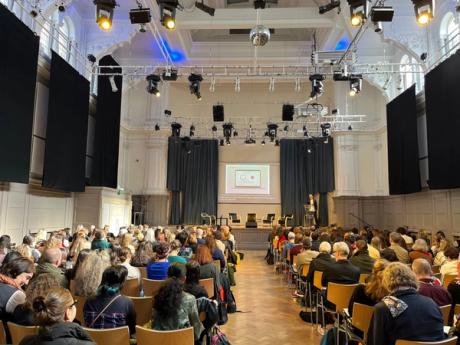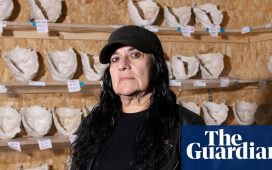The Gallery Climate Coalition (GCC), the international charity supporting sustainability in the art world has ended its International Volunteer Chapter (IVC) programme, citing a lack of funding. The IVC initiative, which launched in 2020 in Berlin and grew to include seven groups of self-organised volunteers globally, represented one of the largest networks of arts professionals working to catalyse climate action in the industry. The chapters were located in Berlin, Italy, London, Los Angeles, New York, Spain and Taiwan.
These chapters helped to organise GCC’s more than 1,500 members, which include galleries, artists and institutions, establishing localised climate initiatives to amplify GCC’s mission of aligning the art sector with the Paris Accord. Though the IVC chapters are closing, GCC remains in existence with its headquarters in London.
In a letter published on GCC’s website on 12 September, managing director Heath Lowndes wrote of the decision: “Over the past year, we have increased engagement with our volunteer groups to understand their challenges and needs. The overwhelming feedback indicated that the chapters require significant financial investments to a higher degree than GCC can provide.” GCC, the statement continues, relies on grants and donations and does not receive governmental funds, issues that are increasingly impacting nonprofits across the sector.
Several volunteers confirmed they were not expecting the closure. “The news came as a surprise and we at GCC Berlin were of course saddened to hear about the dissolution of the IVC programme,” Kim Kraczon, co-founder of GCC Berlin and conservator and materials specialist at Ki Culture, tells The Art Newspaper. “I know GCC did not take the decision lightly and I do understand that if the funding and support to continue the program is lacking, there is not much anyone can do to change this outcome. What many people do not realise, and I feel is important to highlight, is that a small handful of very dedicated individuals are responsible for all of GCC’s operations, and there is only so much GCC can take on financially and in terms of time commitment.”
Among the many resources GCC provides free to the public are a carbon emissions calculator, best practices guidelines in 15 areas (from shipping to decarbonising finance) and commissioned research.
“What these individuals have achieved in positioning GCC as the pre-eminent source of sustainable best practices and guidance in the art world is nothing short of awe-inspiring,” Kraczon adds. “We harbour absolutely zero resentment towards GCC and hope to continue working alongside them as allies in creating an environmentally responsible art world.”
In a statement to The Art Newspaper, Lowndes shared GCC’s plans for an advocacy programme it is developing in place of the IVC initiative: “GCC will launch a new international advocacy programme in 2025 designed to empower its growing global membership to advocate for effective climate action in the visual arts and for the reduction of greenhouse gas emissions in the sector by 2030. Building on learnings from the International Volunteer Programme, this new initiative will provide participants with the tools, skills and knowledge needed to drive environmental responsibility within their professional contexts, fostering a global community of advocates dedicated to reducing emissions in the sector.”
As the news of closure spread through the branches after being internally announced over the last month, volunteers have begun to plan to coalesce outside of the GCC umbrella. GCC Berlin had already become a registered non-profit in Germany prior to IVC’s closure and is now in preliminary discussions to continue under a different name.
“The volunteers from our IVC programme remain important members of GCC’s international community,” Lowndes’s statement to The Art Newspaper continues. “We look forward to continuing working with them as valued members of our coalition and active advocates for climate action.”
Many GCC volunteers are members of other climate groups, such as Galleries Commit and Artists Commit, and additional grassroots initiatives exist regionally, such as Art + Climate Action in the Bay Area. Moreover, additional unifying groups and charters continue to align the industry, including Partners for Arts Climate Targets and Art Charter for Climate Action.
“Most new things grow slowly, step by step; I feel like the existence of the chapters is important in the history of the global art community to enunciate the desire to meet in person, locally,” Haley Mellin, co-founder of GCC Los Angeles and New York and founder of Art to Acres, tells The Art Newspaper. “We’re here to stay as a community based on a commitment to climate health. I am proud of the GCC IVC chapters and appreciated the people, the discourse, the actions and the gatherings. This is a stage of activism, which will take many forms. It doesn’t end the activism.”









